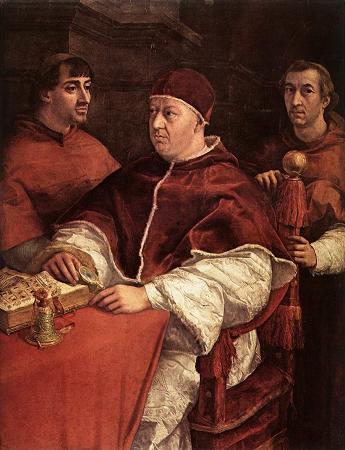Pope Clement VII (1478 - 1534). Pope Clement VII, born Giulio di Giuliano de' Medici, was head of the Catholic Church and ruler of the Papal States from 19 November 1523 to his death on 25 September 1534.The most unfortunate of the Popes, Clement VII's reign was marked by a rapid succession of political, military, and religious struggles, many long in the making, which had far-reaching consequences for Christianity and world politics. Elected in 1523 at the end of the Italian Renaissance, Clement VII came to the papacy with a high reputation as a statesman. He'd served with distinction as chief advisor to Pope Leo X, Pope Adrian VI, and commendably as gran maestro of Florence. Assuming leadership at a time of crisis, with the Protestant Reformation spreading; the Church nearing bankruptcy; and large, foreign armies invading Italy, Clement VII initially tried to unite Christendom by making peace among the many Christian leaders then at odds. He later attempted to liberate Italy from foreign occupation, believing that it threatened the Church's freedom. The complex political situation of the 1520s thwarted Clement's intentions. Inheriting daunting challenges, including Martin Luther's Protestant Reformation in Northern Europe; a vast power struggle in Italy between Europe's two most powerful kings, Holy Roman Emperor Charles V and Francis I of France, each of whom demanded that the Pope choose a side; and Turkish invasions of Eastern Europe led by Suleiman the Magnificent; Clement's problems were exacerbated by King Henry VIII of England's contentious divorce, resulting in England breaking away from the Catholic Church; and in 1527, souring relations with Emperor Charles V leading to the violent Sack of Rome, during which the Pope was imprisoned. After escaping confinement in the Castel Sant'Angelo, Clement, with few economic, military, or political options remaining, compromised the Church's and Italy's independence by allying with his former jailor, Emperor Charles V. In contrast to his tortured Papacy, Clement VII was personally respectable and devout, possessing a dignified propriety of character, great acquirements both theological and scientific, as well as extraordinary address and penetration, Clement VII, in serener times, might have administered the Papal power with high reputation and enviable prosperity. But with all of his profound insight into the political affairs of Europe, Clement does not seem to have comprehended the altered position of the Pope in relation to Europe's emerging nation-states and Protestantism. In matters of science, Clement VII is best known for personally approving, in 1533, Nicolaus Copernicus's theory that the Earth revolves around the Sun, 99 years before Galileo Galilei's heresy trial for similar ideas. Ecclesiastically, Clement VII is remembered for issuing orders protecting Jews from the Inquisition, approving the Capuchin Franciscan Order, and securing the island of Malta for the Knights of Malta. Giulio de' Medici's life began under tragic circumstances. On April 26, 1478, exactly one month before his birth, his father, Giuliano de Medici was murdered in the Florence Cathedral by enemies of his family. Born illegitimately on May 26, 1478, in Florence, the exact identity of his mother remains unknown, although a plurality of scholars contend that it was Fioretta Gorini, the daughter of a university professor. Giulio spent the first seven years of life with his Godfather, the architect Antonio da Sangallo the Elder. Thereafter, Lorenzo the Magnificent raised him as one of his own sons, alongside his children Giovanni, Piero and Giuliano, the former of whom became Pope Leo X. Educated at the Palazzo Medici in Florence by humanists like Angelo Poliziano, and alongside prodigies like Michelangelo, Giulio became an accomplished musician. In personality he was reputed to be shy, and in physical appearance, handsome. Since Giulio's illegitimacy barred him from pursuing high-ranking positions in the Church, his natural inclination was for the clergy, Lorenzo the Magnificent helped him carve out a career in the military. He was enrolled in the Knights of Rhodes, but also became Grand Prior of Capua. In 1492, when Lorenzo the Magnificent died and Giovanni de' Medici assumed his duties as a cardinal, Giulio became more involved in Church affairs. He studied canon law at the University of Pisa, and accompanied Giovanni to the conclave of 1492, where Rodrigo Borgia was elected Pope Alexander VI. Following the fortunes of Lorenzo the Magnificent's firstborn son, Piero the Unfortunate, in 1494, the Medici were expelled from Florence.
more...






